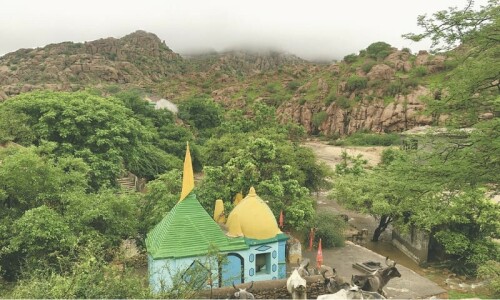KARACHI: In a major initiative for conservation of biodiversity, the Sindh forest and wildlife department has recently declared Gughar — a high value medicinal plant internationally declared critically endangered — as protected.
The decision has come in light of Sindh High Court’s last year’s order placing a complete ban on mining and excavation activities at Nagarparkar’s Karoonjar hills, a key habitat of the plant.
“In compliance with the orders of the Honourable High Court, Sindh, in constitutional petition No. 40 of 2021 and 1127 of 2023 dated 16-10-2023 and in accordance with Rule 56 sub rule (1)(2)(3) and Rule 57, sub rule (7) of Sindh Wildlife Protection Rules 2022, Sindh Wildlife Department, Government of Sindh, is pleased to accord protected status to the wild-growing “Gughar” plant,” says the notification.
It highlights its global conservation status — the plant is included in the IUCN (International Union for Conservation of Nature) Red Data List and part of the CITES Appendix II — and imposes a ban on the extraction of the plant’s secretion known as guggulu/gughral, trade of the plant, its export and commercial scale transportation.
“Such actions shall constitute offenses under the provisions of Sindh Wildlife Protection Act 2020 and Rules 2022 and the Forest Act 1927. Violations will be subjected to legal ramifications as per the prevailing laws,” the notification adds.
The court in its order had directed the wildlife department to take all measures to “resurrect the sanctuary for all those animals, birds, species whose habitat is/was Karoonjhar hills”.
“Process of resurrecting the forest should start “now” and the process of the plantation of the trees, which could grow and thrive in the said region, should be started and record of the plantation be maintained and each hill with the plantation process and plants/trees be monitored and quarterly report to this effect be filed before the court,” the order stated.
The ‘genocide’ of plants
Sources said that the protected status for Gughar was long overdue as its ‘merciless killing’ and subsequent export of its high value resin had been going on in the province for a long time.
Highlighting the benefits of the plant, Dr Syed Ghulam Musharraf, a senior researcher associated with Karachi University’s HEJ Research Institute of Chemistry, said it’s one of the most trusted herbs which had been traditionally used as a purifying agent and a tonic that helped rejuvenate our cells/tissues.
“It plays an important role in balancing the nervous system, and solving reproductive system related complaints,” he said, adding that the plant was found in Balochistan and parts of Sindh.
According to him, the plant produces a dense oily resin known as Guggulu or Guggul. This substance is widely used in traditional medicines for the treatment of various disorders, either by itself or fortified with other herbs to promote specific actions.
“It is also prescribed to treat a variety of disorders such as obesity, rheumatoid arthritis, arteriosclerosis, inflammation and cardiovascular diseases. Recently, it has been found to exert cytotoxicity against human breast cancer and multiple myeloma,” he said, adding that the plant extracts were also found to inhibit tumor growth and lower blood lipids.
Prof Musharraf regretted that people in their greed for money adopted very cruel methods for resin’s extraction, causing the plant’s immediate death.
Sindh Wildlife Conservator Javed Ahmed Mahar explained that the plant was often injected with toxic chemicals to get all the resin at once.
“This is plants’ genocide that has led to a steep decline in its numbers and associated habitats. Today, we are in a position to take action against the perpetrators,” he said, adding that the enactment of the ban on the plant’s exports and trade would discourage people from engaging in any activity causing harm to the plant.
However, he was of the opinion that the cultivation of the precious plant should be supported as that would benefit the people and the country.
Published in Dawn, March 30th, 2024















































Dear visitor, the comments section is undergoing an overhaul and will return soon.